英语强调句
英语强调句

一、强调句(The Emphatic Pattern)是一种修辞,是人们为了表达自己的意愿或情感而使用的一种形式。
通过各种方式对句子中的某个部分进行强调,从而起到修辞的作用。
英语常用的强调结构是"It is (was)+被强调部分(主语、宾语或状语)+who (that)..."。
一般说来,被强调部分指人时,用who;指事物时用that,但that也可以指人。
强调句型,即“It is/was+被强调部分+that/who/whom+其它”句型之中。
使用该句型有以下几点请注意:1、强调句的谓语is或was永远用单数.It was yesterday that I met your father in the street.2、不管被强调部分是哪种状语,只能用that连接,不得使用where、when等连词.It was in the street that I met your father yesterday.3、被强调部分为人时,可用who(主格或宾格)和whom(宾格)代替that,用that也行。
1)It was your father that/whom /who I met in the street yesterday.2) It was I that/who met your father in the street yesterday.4、强调句中也要注意主谓一致、人称一致和否定转移的问题。
1)It is they who are our friends.2) It was not until ten o'clock that we got home last night.5、注意不要混淆强调句和其他从句。
It is was…that…为强调句标志,去掉后仍可组成一个完整的句子,只是没被强调,而其他从句一般不具备这一特征。
比较:1) It was ten o'clock when we got home last night.我们昨晚到家时已十点了。
(完整版)英语强调句及it用法大全
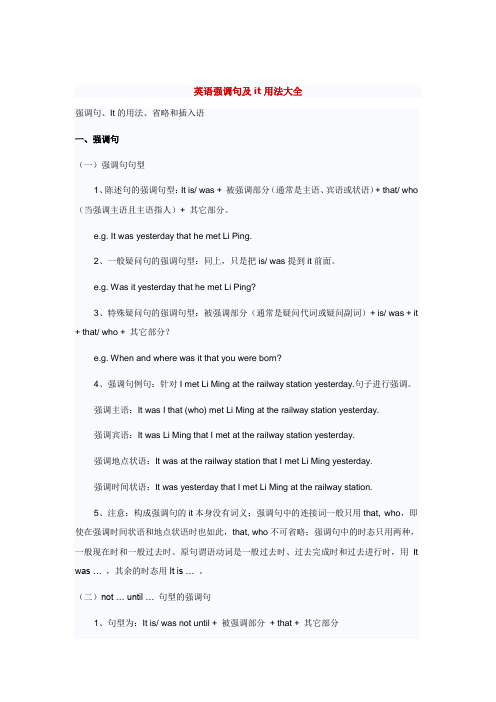
英语强调句及it用法大全强调句、It的用法、省略和插入语一、强调句(一)强调句句型1、陈述句的强调句型:It is/ was + 被强调部分(通常是主语、宾语或状语)+ that/ who (当强调主语且主语指人)+ 其它部分。
e.g. It was yesterday that he met Li Ping.2、一般疑问句的强调句型:同上,只是把is/ was提到it前面。
e.g. Was it yesterday that he met Li Ping?3、特殊疑问句的强调句型:被强调部分(通常是疑问代词或疑问副词)+ is/ was + it + that/ who + 其它部分?e.g. When and where was it that you were born?4、强调句例句:针对I met Li Ming at the railway station yesterday.句子进行强调。
强调主语:It was I that (who) met Li Ming at the railway station yesterday.强调宾语:It was Li Ming that I met at the railway station yesterday.强调地点状语:It was at the railway station that I met Li Ming yesterday.强调时间状语:It was yesterday that I met Li Ming at the railway station.5、注意:构成强调句的it本身没有词义;强调句中的连接词一般只用that, who,即使在强调时间状语和地点状语时也如此,that, who不可省略;强调句中的时态只用两种,一般现在时和一般过去时。
原句谓语动词是一般过去时、过去完成时和过去进行时,用It was … ,其余的时态用It is … 。
英语强调句的七种常见句式

英语强调句的七种常见句式我们在说话或写文章时,为了要突出句子中的某一部分,我们通常会使用某种方法或手段使它突出,以便能引起他人的注意,这就是强调,与此相关的句子就是强调句。
英语表示强调的方法很多,比如在口语中可以用重读来强调,在书面语中则可通过使用表示强调意义的词语来强调,也可以通过将被强调成分置于句首这样的“显要”位置来强调,还可以使用专门的强调句式来强调。
■用助动词do来强调当句子中没有其他的助动词时,我们可以在动词前使用助动词do表示对该动词的强调。
如:Do be careful with that vase! 务必小心那个花瓶!I do hope you’ll stay for lunch. 我真的希望你留下吃午饭。
用于表示强调的do可以有时态的变化,但其后的动词要用原形。
如:He does look tired. 他确实显得很疲倦。
He did come but soon went back. 他的确来过,但很快就回去了。
She did write to say thank you. 她的确写信向你道谢了。
注意,这样用的do只用于现在时或过去式(即只有do, does, did这样的形式),不能用于进行时、完成时等形式(如不用于is doing, has done等)。
■用某些形容词来强调英语中用于强调的形容词比较多,比如那些表示“极端”和“完全”概念的形容词通常就可以用于表示强调,这类形容词主要的有:mere 仅仅的very 极端的outright 完全的thorough 十足的plain 完全的complete 彻底的pure 完全的perfect 全然的Jim looked a perfect fool. 吉姆看起来像一个十足的傻瓜。
At that very moment the phone rang. 正好在那个时候电话铃响了。
We gave the room a thorough cleaning. 我们把房间彻底打扫了一番。
英语语法大全:强调句
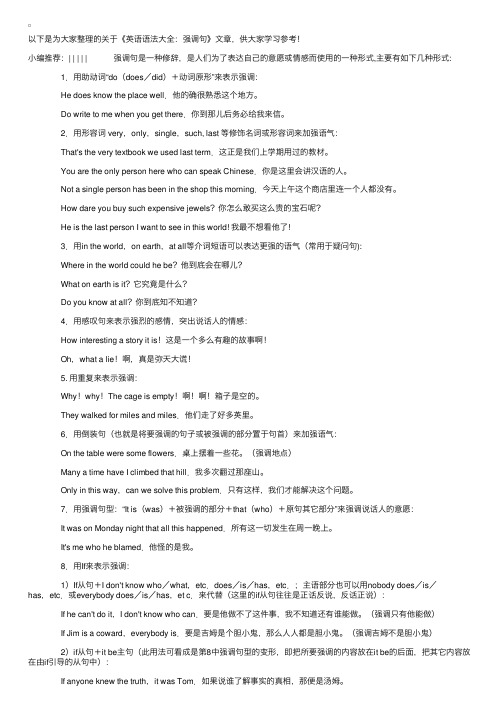
以下是为⼤家整理的关于《英语语法⼤全:强调句》⽂章,供⼤家学习参考!⼩编推荐:| | | | | 强调句是⼀种修辞,是⼈们为了表达⾃⼰的意愿或情感⽽使⽤的⼀种形式,主要有如下⼏种形式: 1.⽤助动词“do(does/did)+动词原形”来表⽰强调: He does know the place well.他的确很熟悉这个地⽅。
Do write to me when you get there.你到那⼉后务必给我来信。
2.⽤形容词 very,only,single,such, last 等修饰名词或形容词来加强语⽓: That's the very textbook we used last term.这正是我们上学期⽤过的教材。
You are the only person here who can speak Chinese.你是这⾥会讲汉语的⼈。
Not a single person has been in the shop this morning.今天上午这个商店⾥连⼀个⼈都没有。
How dare you buy such expensive jewels?你怎么敢买这么贵的宝⽯呢? He is the last person I want to see in this world! 我最不想看他了! 3.⽤in the world,on earth,at all等介词短语可以表达更强的语⽓(常⽤于疑问句): Where in the world could he be?他到底会在哪⼉? What on earth is it?它究竟是什么? Do you know at all?你到底知不知道? 4.⽤感叹句来表⽰强烈的感情,突出说话⼈的情感: How interesting a story it is!这是⼀个多么有趣的故事啊! Oh,what a lie!啊,真是弥天⼤谎! 5. ⽤重复来表⽰强调: Why!why!The cage is empty!啊!啊!箱⼦是空的。
英语强调句型
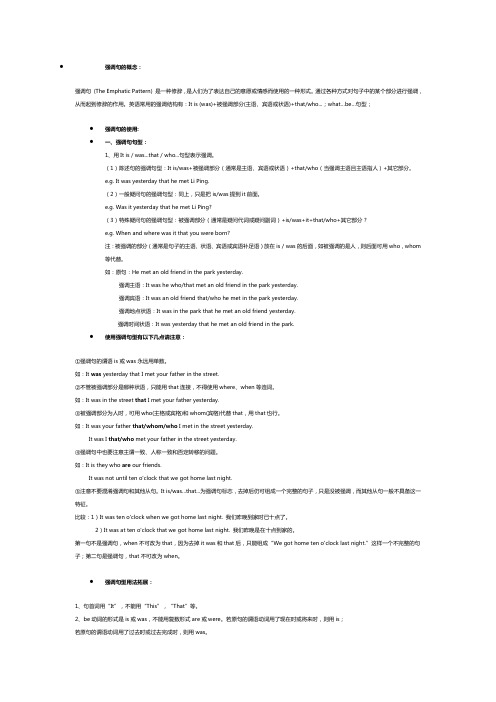
∙强调句的概念:强调句(The Emphatic Pattern) 是一种修辞,是人们为了表达自己的意愿或情感而使用的一种形式。
通过各种方式对句子中的某个部分进行强调,从而起到修辞的作用。
英语常用的强调结构有:It is (was)+被强调部分(主语、宾语或状语)+that/who...;what…be…句型;∙强调句的使用:∙一、强调句句型:1、用It is/was...that/who...句型表示强调。
(1)陈述句的强调句型:It is/was+被强调部分(通常是主语、宾语或状语)+that/who(当强调主语且主语指人)+其它部分。
e.g. It was yesterday that he met Li Ping.(2)一般疑问句的强调句型:同上,只是把is/was提到it前面。
e.g. Was it yesterday that he met Li Ping?(3)特殊疑问句的强调句型:被强调部分(通常是疑问代词或疑问副词)+is/was+it+that/who+其它部分?e.g. When and where was it that you were born?注:被强调的部分(通常是句子的主语、状语、宾语或宾语补足语)放在is/was的后面,如被强调的是人,则后面可用who,whom等代替。
如:原句:He met an old friend in the park yesterday.强调主语:It was he who/that met an old friend in the park yesterday.强调宾语:It was an old friend that/who he met in the park yesterday.强调地点状语:It was in the park that he met an old friend yesterday.强调时间状语:It was yesterday that he met an old friend in the park.∙使用强调句型有以下几点请注意:①强调句的谓语is或was永远用单数。
英语强调句七种
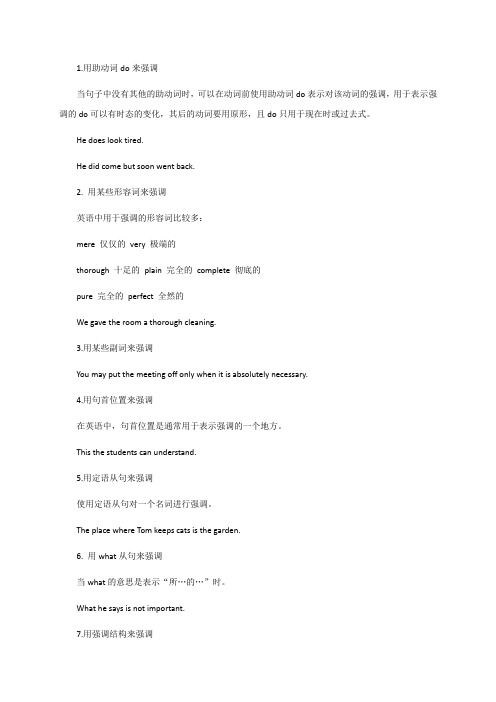
1.用助动词do来强调
当句子中没有其他的助动词时,可以在动词前使用助动词do表示对该动词的强调,用于表示强调的do可以有时态的变化,其后的动词要用原形,且do只用于现在时或过去式。
He does look tired.
He did come but soon went back.
2. 用某些形容词来强调
英语中用于强调的形容词比较多:
mere 仅仅的very 极端的
thorough 十足的plain 完全的complete 彻底的
pure 完全的perfect 全然的
We gave the room a thorough cleaning.
3.用某些副词来强调
You may put the meeting off only when it is absolutely necessary.
4.用句首位置来强调
在英语中,句首位置是通常用于表示强调的一个地方。
This the students can understand.
5.用定语从句来强调
使用定语从句对一个名词进行强调。
The place where Tom keeps cats is the garden.
6. 用what从句来强调
当what的意思是表示“所…的…”时。
What he says is not important.
7.用强调结构来强调
“it is (was)+被强调成分+that (who)+其他”结构。
It was not until I met you that I knew real happiness.。
强调句句型

强调句句型研究必备欢迎下载一、强调句(一)强调句句型1、陈述句的强调句型:It is/ was +被强调部分(通常是主语、宾语或状语)+ that/ who(当强调主语且主语指人)+其它部分。
e.g. It was yesterday that he met Li Ping.2、一般疑问句的强调句型:同上,只是把is/ was提到it 前面。
e.g. Was it yesterday that he met Li Ping?3、特殊疑问句的强调句型:被强调部分(通常是疑问代词或疑问副词)+ is/ was + it + that/ who +其它部分?e.g. When and where was it that you were born?4、强调句例句:针对I met Li Ming at the railway station yesterday.句子进行强调。
强调主语:It was I that (who) met Li Ming at the railway station yesterday.强调宾语:It was Li Ming that I met at the railway station yesterday.夸大地址状语:It was at the railway station that I met Li Ming yesterday.夸大工夫状语:It was yesterday that I met Li Ming at the railway station.5、留意:组成夸大句的it自己没有词义;夸大句中的毗连词通俗只用that, who,纵然在夸大工夫状语和地址状语时也云云,that, who不成省略;夸大句中的时态只用两种,通俗现在时和通俗曩昔时。
原句谓语动词是通俗曩昔时、曩昔完成时和过去进行时,用It was …,其余的时态用It is …。
(二)not … until …句型的强调句1、句型为:It is/ was not until +被强调部分+ that +其它部分e.g.通俗句:He didn’t go to bed until/ till his wife came back.强调句:It was not until his wife came back that he went to bed.2、注意:此句型只用until,不用till。
英语强调句

强调句
1.强调句一般可强调主语,宾语,状语等。 It 本身没词义,只起引导作用。 2.引导词that/who/whom,
3.be: is was
It is(was)+被强调部分+that(who)+其余部分 I saw Kate in the park last week. It was I that/who saw Kate in the park last week. It was Kate that/who/whom I saw in the park last we It was in the park that I saw Kate last week. It was last week that I saw Kate in the park.
2.It was only when I reread his poems recently _I began to appreciate their beauty. A.until B. that C. then D. so
3.It was about 600 years ago __ the first clock with a face and an hour hand was made A. that B.until C.before D.when
直到她摘下墨镜我们才认出她是个大明星
We didn't recognize she was a super star until she took off the black glasses.
It was not until she took off the black glasses that we recognized she was a super star.
英语中的强调句句型

英语中的强调句型1.It is/was+被强调部分+that+其他成分(其中被强调部分主语/宾语/状语)今天早上正是我在公园遇见了他。
It was i who/that met him in the park this morning.(强调主语)今天早上我在公园遇见的正是他。
It was him that i met in the park this morning.(强调宾语)今天早上我正是在公园里遇见了他。
It was in the park that i met him this morning.(强调地点状语)正是今天早上我在公园里遇见了他。
It was this morning that i met him in the park.今天他没去上学是因为他生病了。
It was because he was ill that he didn’t go to school.2.强调句型的一般疑问句:把be动词提前,它的特殊疑问句只需把特殊疑问词放到一般疑问句前是史密斯打碎窗子的吗?是谁打开了门?3.not...until...的强调句式:当被强调的是not...until..句型时,应将not置于until之前,主句由否定句改为肯定句她把眼镜拿了,我们才认出她。
We didn’t recognize her until she took off her glasses.It was not until she took off her glasses that we recognized her.Not until she took off her glasses did we recognize her.。
英语中的强调句句型
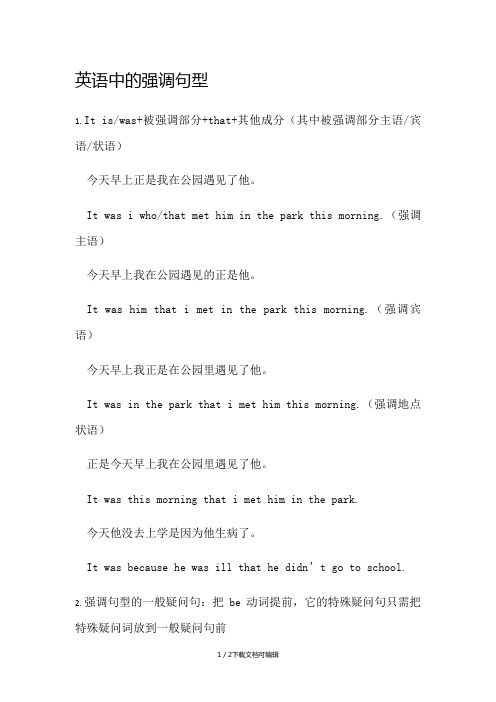
英语中的强调句型1.It is/was+被强调部分+that+其他成分(其中被强调部分主语/宾语/状语)今天早上正是我在公园遇见了他。
It was i who/that met him in the park this morning.(强调主语)今天早上我在公园遇见的正是他。
It was him that i met in the park this morning.(强调宾语)今天早上我正是在公园里遇见了他。
It was in the park that i met him this morning.(强调地点状语)正是今天早上我在公园里遇见了他。
It was this morning that i met him in the park.今天他没去上学是因为他生病了。
It was because he was ill that he didn’t go to school.2.强调句型的一般疑问句:把be动词提前,它的特殊疑问句只需把特殊疑问词放到一般疑问句前是史密斯打碎窗子的吗?是谁打开了门?3.not...until...的强调句式:当被强调的是not...until..句型时,应将not置于until之前,主句由否定句改为肯定句她把眼镜拿了,我们才认出她。
We didn’t recognize her until she took off her glasses.It was not until she took off her glasses that we recognized her.Not until she took off her glasses did we recognize her.(学习的目的是增长知识,提高能力,相信一分耕耘一分收获,努力就一定可以获得应有的回报)。
英语的强调句型

英语的强调句型有以下这些:
1. It is/was + 被强调部分+ that/who + 句子其余部分。
例如:It was John who won the singing competition.
翻译:是约翰赢得了唱歌比赛。
2. What/How + 被强调部分+ 句子其余部分。
例如:What a beautiful sunset it is!
翻译:多美的日落啊!
3. Not only + 助动词/情态动词+ 主语+ 谓语,but also + 强调部分。
例如:Not only did she pass the exam, but she also got the highest score. 翻译:她不仅通过了考试,而且还获得了最高分。
4. 虚拟形式的强调句型:
If only + 主语+ 过去式,(then) + 结果。
例如:If only I had studied harder, I would have passed the test.
翻译:要是我当时学得更努力就好了,我就能通过那次考试了。
这些强调句型可以帮助我们在表达中有效地突出某个信息。
请注意,具体使用哪种强调句型取决于语境和强调的对象。
英语专业强调句

强调句是一种修辞,是人们为了表达自己的意愿或情感而使用的一种形式,主要有如下几种形式:1.用助动词“do(does/did)+动词原形”来表示强调:He does know the place well.他的确很熟悉这个地方。
Do write to me when you get there.你到那儿后务必给我来信。
2.用形容词very,only,single,such, last 等修饰名词或形容词来加强语气:That's the very textbook we used last term.这正是我们上学期用过的教材。
You are the only person here who can speak Chinese.你是这里唯一会讲汉语的人。
Not a single person has been in the shop this morning.今天上午这个商店里连一个人都没有。
How dare you buy such expensive jewels?你怎么敢买这么贵的宝石呢?He is the last person I want to see in this world! 我最不想看他了!3.用in the world,on earth,at all等介词短语可以表达更强的语气(常用于疑问句):Where in the world could he be?他到底会在哪儿?What on earth is it?它究竟是什么?Do you know at all?你到底知不知道?4.用感叹句来表示强烈的感情,突出说话人的情感:How interesting a story it is!这是一个多么有趣的故事啊!Oh,what a lie!啊,真是弥天大谎!5. 用重复来表示强调:Why!why!The cage is empty!啊!啊!箱子是空的。
They walked for miles and miles.他们走了好多英里。
高中英语语法专题系列:强调句
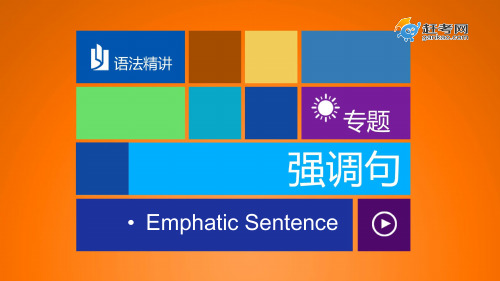
强调句 4. 受插入语的影响将强调句型误判为非强调句型。
1)It was lack of money, not of effort, _____ defeated their plan. A. which B. as C. that D. what 答案:C 2. It was because of English girlfriend, believe it or not, ______ his English improved so greatly. A. which B. as C. that D. what 答案:C
强调句
4)强调句的判断
把“It is/was...that”去掉,如果剩余部分句子结构仍然完整, 那么这个句子就是强调句;如果句子不完整,则不是强调句。
It is true that he once went to America. It was 8 o’clock that he came back. It was at 8 o’clock that he came back. It is on the bus that I met Mary yesterday.
强调句
1)一般疑问句的强调
结构:Is/Was it + 被强调部分 + that + ...
(1)Did you meet your brother at Mc Donald ?(强调宾语) Was it your brother that you met at Mc Donald? (2)Has Tom borrowed your money recently? (强调主语) Is it Tom that has borrowed your money recently?
英语强调句

英语强调句英语的强调主要有两种:一是强调非谓语(包括主语、宾语、状语等);二是强调谓语动词。
(一)强调非谓语其基本句型是:“It + is/was + 被强调的成分+ that/who + 其她成分”。
It 没有实意,只起语法作用,引导被强调的部分。
当被强调的是人时,可用who(m)/that, 其他情况用that。
例如:It was I who/that met Jack yesterday. 是我昨天碰到了Jack.(强调主语)It was Jack that/whom I met yesterday. 我昨天碰到的是Jack。
(强调宾语)It was yesterday that I met Jack. 是昨天我碰到了Jack.(强调时间状语)这几句话复原为非强调句就是:I met Jack yesterday.It is people, not things, that are decisive. 决定的因素是人,不是物。
(强调主语)It is because the book is very important for my present job that I bought it. 是因为这本书对我目前的工作很有用,我才买了它。
(强调原因状语)It was in the supermarket that I gave the book to him. 是在那家超市里我给了他那本书。
(强调地点状语)1.强调主语:It was John who broke the window. 是John打破了窗子。
原句:John broke the window.It is the people who/that are really powerful. 真正有力量的是人民。
原句:The people are really powerful.2.强调状语:(1)强调时间状语。
例如:It was at that moment that he changed his mind.是在那一刻他改变了主意。
强调句典型例句100句
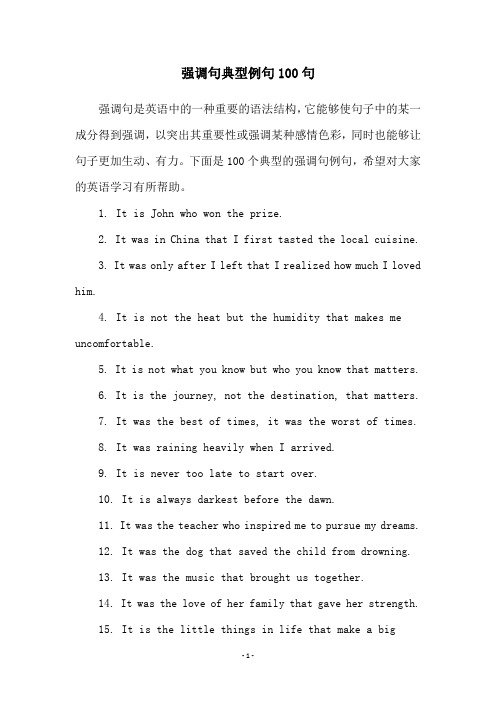
强调句典型例句100句强调句是英语中的一种重要的语法结构,它能够使句子中的某一成分得到强调,以突出其重要性或强调某种感情色彩,同时也能够让句子更加生动、有力。
下面是100个典型的强调句例句,希望对大家的英语学习有所帮助。
1. It is John who won the prize.2. It was in China that I first tasted the local cuisine.3. It was only after I left that I realized how much I loved him.4. It is not the heat but the humidity that makes me uncomfortable.5. It is not what you know but who you know that matters.6. It is the journey, not the destination, that matters.7. It was the best of times, it was the worst of times.8. It was raining heavily when I arrived.9. It is never too late to start over.10. It is always darkest before the dawn.11. It was the teacher who inspired me to pursue my dreams.12. It was the dog that saved the child from drowning.13. It was the music that brought us together.14. It was the love of her family that gave her strength.15. It is the little things in life that make a bigdifference.16. It is the thought that counts.17. It was the kindness of strangers that helped me througha difficult time.18. It was the beauty of the sunset that took my breath away.19. It was the silence that spoke volumes.20. It was the courage of the firefighters that saved the building from burning down.21. It is the people, not the place, that make a home.22. It is the memories that we cherish most.23. It was the laughter that echoed through the room.24. It was the tears that flowed freely.25. It is the truth that will set you free.26. It is the lie that will come back to haunt you.27. It was the fear that paralyzed me.28. It was the anger that consumed me.29. It is the happiness that we all strive for.30. It is the sadness that we all try to avoid.31. It is the fear of the unknown that holds us back.32. It was the excitement that filled the air.33. It was the disappointment that hung heavy in the room.34. It is the hope that keeps us going.35. It is the despair that can bring us down.36. It was the confidence that led to his success.37. It was the doubt that held him back.38. It is the love that makes life worth living.39. It is the hate that can tear us apart.40. It was the joy that filled her heart.41. It was the sorrow that weighed her down.42. It is the courage to take risks that leads to great rewards.43. It is the fear of failure that holds us back.44. It was the determination that led to his victory.45. It was the lack of motivation that led to his defeat.46. It is the perseverance that leads to success.47. It is the giving up that leads to failure.48. It is the hard work that leads to achievement.49. It is the laziness that leads to mediocrity.50. It was the confidence that made her shine.51. It was the shyness that made her fade into the background.52. It is the intelligence that leads to success.53. It is the ignorance that leads to failure.54. It was the honesty that earned him respect.55. It was the dishonesty that earned him scorn.56. It is the loyalty that builds strong relationships.57. It is the betrayal that tears them apart.58. It was the generosity that made her beloved.59. It was the selfishness that made her despised.60. It is the forgiveness that heals wounds.61. It is the grudge that festers and grows.62. It was the respect that he showed that earned him admiration.63. It was the disrespect that he showed that earned him contempt.64. It is the humility that makes us human.65. It is the arrogance that makes us insufferable.66. It was the gratitude that she expressed that touched their hearts.67. It was the ingratitude that she showed that turned them away.68. It is the patience that leads to understanding.69. It is the impatience that leads to frustration.70. It was the understanding that led to reconciliation.71. It was the misunderstanding that led to conflict.72. It is the communication that leads to resolution.73. It is the lack of communication that leads to misunderstanding.74. It was the teamwork that led to success.75. It was the individualism that led to failure.76. It is the cooperation that leads to progress.77. It is the competition that leads to stagnation.78. It was the harmony that made them a great team.79. It was the discord that tore them apart.80. It is the balance that leads to a healthy life.81. It is the imbalance that leads to an unhealthy life.82. It was the moderation that led to his longevity.83. It was the excess that led to his downfall.84. It is the simplicity that leads to happiness.85. It is the complexity that leads to stress.86. It was the beauty of the natural world that inspired him.87. It was the ugliness of the city that depressed him.88. It is the peace of the countryside that soothes the soul.89. It is the chaos of the city that frazzles the nerves.90. It was the serenity of the ocean that calmed her.91. It was the turbulence of the storm that frightened her.92. It is the freedom of expression that is a fundamental human right.93. It is the censorship of expression that is a violation of human rights.94. It was the diversity of cultures that enriched his life.95. It was the homogeneity of cultures that bored him.96. It is the tolerance of differences that leads to harmony.97. It is the intolerance of differences that leads to conflict.98. It was the acceptance of change that led to progress.99. It was the resistance to change that led to stagnation. 100. It is the adaptability that leads to survival.以上是100个典型的强调句例句,通过这些例句的学习,我们可以更好地理解强调句的语法结构和用法,同时也能够提高自己的英语表达能力。
英语强调句的七种常见句式

英语强调句的七种常见句式我们在说话或写文章时,为了要突出句子中的某一部分,我们通常会使用某种方法或手段使它突出,以便能引起他人的注意,这就是强调,与此相关的句子就是强调句。
英语表示强调的方法很多,比如在口语中可以用重读来强调,在书面语中则可通过使用表示强调意义的词语来强调,也可以通过将被强调成分置于句首这样的“显要”位置来强调,还可以使用专门的强调句式来强调。
■用助动词do来强调当句子中没有其他的助动词时,我们可以在动词前使用助动词do表示对该动词的强调。
如:Do be careful with that vase! 务必小心那个花瓶!I do hope you’ll stay for lunch. 我真的希望你留下吃午饭。
用于表示强调的do可以有时态的变化,但其后的动词要用原形。
如:He does look tired. 他确实显得很疲倦。
He did come but soon went back. 他的确来过,但很快就回去了。
She did write to say thank you. 她的确写信向你道谢了。
注意,这样用的do只用于现在时或过去式(即只有do, does, did这样的形式),不能用于进行时、完成时等形式(如不用于is doing, has done等)。
■用某些形容词来强调英语中用于强调的形容词比较多,比如那些表示“极端”和“完全”概念的形容词通常就可以用于表示强调,这类形容词主要的有:mere 仅仅的very 极端的outright 完全的thorough 十足的plain 完全的complete 彻底的pure 完全的perfect 全然的Jim looked a perfect fool. 吉姆看起来像一个十足的傻瓜。
At that very moment the phone rang. 正好在那个时候电话铃响了。
We gave the room a thorough cleaning. 我们把房间彻底打扫了一番。
强调句典型例句100句

强调句典型例句100句强调句是英语中非常重要的语法结构之一,它可以用来强调某个句子成分的重要性或者突出某个观点的重要性。
在英语中,强调句常常使用倒装句和强调副词来表达。
下面是100个典型的强调句例句,希望对大家的英语学习有所帮助。
1. It was John who stole the money.(强调主语)2. It is the teacher who makes the difference in education.(强调主语)3. It was in Paris where I met my wife.(强调地点状语)4. It is only after we have lost everything that we are free to do anything.(强调时间状语)5. It was not until I met him that I realized how muchI loved him.(强调时间状语)6. It was in the library that I found the book.(强调地点状语)7. It was on the top of the mountain that we saw the sunrise.(强调地点状语)8. It was not until I got home that I realized I had left my keys in the office.(强调时间状语)9. It was only when I saw the movie that I understood the book.(强调时间状语)10. It is the little things that count.(强调宾语)11. It is the people who make the difference.(强调主语)12. It was the best party I have ever been to.(强调宾语)13. It is not what you say, but how you say it.(强调宾语)14. It is not what you know, but who you know.(强调宾语)15. It was not the answer I was looking for.(强调宾语)16. It was the worst day of my life.(强调宾语)17. It is not until you lose everything that yourealize what you had.(强调宾语)18. It is only when you are alone that you can truly be yourself.(强调宾语)19. It is not how much you have, but how much you enjoy that makes you happy.(强调宾语)20. It was the most beautiful sunset I have ever seen.(强调宾语)21. It is not what you do, but how you do it that matters.(强调宾语)22. It was the most delicious meal I have ever had.(强调宾语)23. It is not what you wear, but how you wear it that makes you stylish.(强调宾语)24. It was the most exciting game I have ever watched.(强调宾语)25. It is not where you go, but who you go with that makes the trip memorable.(强调宾语)26. It was the scariest movie I have ever seen.(强调宾语)27. It is not what you have, but what you give that defines you.(强调宾语)28. It was the longest journey I have ever taken.(强调宾语)29. It is not what you achieve, but how you achieve it that matters.(强调宾语)30. It was the most challenging project I have ever worked on.(强调宾语)31. It is not what you say, but what you do that counts.(强调宾语)32. It was the most difficult decision I have ever made.(强调宾语)33. It is not what you have, but what you do with whatyou have that matters.(强调宾语)34. It was the most important lesson I have ever learned.(强调宾语)35. It is not what you have, but who you are that matters.(强调宾语)36. It was the most inspiring speech I have ever heard.(强调宾语)37. It is not what you take, but what you leave behind that counts.(强调宾语)38. It was the most memorable vacation I have ever had.(强调宾语)39. It is not what you gain, but what you give up that defines you.(强调宾语)40. It was the most romantic evening I have ever had.(强调宾语)41. It is not what you earn, but how you earn it that matters.(强调宾语)42. It was the most satisfying meal I have ever had.(强调宾语)43. It is not what you receive, but what you give that makes you rich.(强调宾语)44. It was the most touching story I have ever heard.(强调宾语)45. It is not what you have, but what you do that defines you.(强调宾语)46. It was the most wonderful experience I have ever had.(强调宾语)47. It is not what you get, but what you give that matters.(强调宾语)48. It was the most amazing sight I have ever seen.(强调宾语)49. It is not what you have, but what you share that makes you happy.(强调宾语)50. It was the most beautiful wedding I have ever attended.(强调宾语)51. It is not what you believe, but how you act on your beliefs that matters.(强调宾语)52. It was the most breathtaking view I have ever seen.(强调宾语)53. It is not what you have, but what you do with what you have that counts.(强调宾语)54. It was the most challenging obstacle I have ever faced.(强调宾语)55. It is not what you know, but how you apply what youknow that matters.(强调宾语)56. It was the most difficult test I have ever taken.(强调宾语)57. It is not what you say, but how you say it that matters.(强调宾语)58. It was the most exciting adventure I have ever had.(强调宾语)59. It is not what you have, but who you are that counts.(强调宾语)60. It was the most important decision I have ever made.(强调宾语)61. It is not what you do, but why you do it that matters.(强调宾语)62. It was the most memorable moment I have ever experienced.(强调宾语)63. It is not what you have, but what you give that makes you rich.(强调宾语)64. It was the most rewarding experience I have ever had.(强调宾语)65. It is not what you say, but what you do that defines you.(强调宾语)66. It was the most satisfying job I have ever had.(强调宾语)67. It is not what you have, but what you do with it that counts.(强调宾语)68. It was the most surprising news I have ever heard.(强调宾语)69. It is not what you have, but what you do that makes you happy.(强调宾语)70. It was the most unusual experience I have ever had.(强调宾语)71. It is not what you have, but what you do that matters.(强调宾语)72. It was the most wonderful feeling I have ever experienced.(强调宾语)73. It is not what you have, but what you do with what you have that counts.(强调宾语)74. It was the most beautiful painting I have ever seen.(强调宾语)75. It is not what you have, but what you do that defines you.(强调宾语)76. It was the most challenging task I have ever undertaken.(强调宾语)77. It is not what you have, but what you do that makesa difference.(强调宾语)78. It was the most exciting event I have ever attended.(强调宾语)79. It is not what you have, but what you do that makes you successful.(强调宾语)80. It was the most important experience I have ever had.(强调宾语)81. It is not what you have, but what you do that makes you great.(强调宾语)82. It was the most meaningful conversation I have ever had.(强调宾语)83. It is not what you have, but what you give that makes you valuable.(强调宾语)84. It was the most powerful speech I have ever heard.(强调宾语)85. It is not what you have, but what you do that makes you extraordinary.(强调宾语)86. It was the most satisfying experience I have ever had.(强调宾语)87. It is not what you have, but what you do that makes you special.(强调宾语)88. It was the most significant event I have ever beena part of.(强调宾语)89. It is not what you have, but what you do that makes you unique.(强调宾语)90. It was the most valuable lesson I have ever learned.(强调宾语)91. It is not what you have, but what you do that makes you important.(强调宾语)92. It was the most challenging experience I have ever had.(强调宾语)93. It is not what you have, but what you do that makes you admirable.(强调宾语)94. It was the most enriching experience I have ever had.(强调宾语)95. It is not what you have, but what you do that makes you successful.(强调宾语)96. It was the most fulfilling experience I have ever had.(强调宾语)97. It is not what you have, but what you do that makes you happy.(强调宾语)98. It was the most life-changing experience I have ever had.(强调宾语)99. It is not what you have, but what you do that makesyou fulfilled.(强调宾语)100. It was the most transformational experience I have ever had.(强调宾语)总之,强调句在英语中是一种非常重要的语法结构,可以用来强调句子成分的重要性或者突出某个观点的重要性。
- 1、下载文档前请自行甄别文档内容的完整性,平台不提供额外的编辑、内容补充、找答案等附加服务。
- 2、"仅部分预览"的文档,不可在线预览部分如存在完整性等问题,可反馈申请退款(可完整预览的文档不适用该条件!)。
- 3、如文档侵犯您的权益,请联系客服反馈,我们会尽快为您处理(人工客服工作时间:9:00-18:30)。
Isn't she of Chinese nationality?难道她不是中国籍?(她的确是中国籍。)
(4)双重否定:多用来表示一种强烈的肯定。例如:
You couldn't go out to play with other children unless you finished your homework.你不能
所谓强调,就是通过某种手段把句子的一部分甚至整个句子所表达的信息加以突出、强调。表示强调的手段很多,这里我们主要讨论一下常见的语法强调、词汇强调和修辞强调。
一、语法强调
(1)一般情况下,反身代词放在所要强调的词语后来加强语气,译为“自己”或“亲自”。例如:
Mary herself did it.玛丽亲自做那件事。
Even now she doesn’t believe him.甚至现在她还不信任他。
这里,even还可以用来强调比较级。又如:
It was hot several days ago.It is even hotter today.几天前天气比较热。今天天气更热。
(4)just:一般放在其所强调的词语或从句之前来加强语气。例如:
Only Mary found the park.只有玛丽找到了那公园。
John only saw the tree.约翰仅仅看到了那棵树。
注意:Only +被强调的状语放在句首时,语序要用倒装形式。例如:
Only after you finished your homework could you go to the cinema.只有你做完作业你才能去看
Even the most complicated problems,a computer can solve in a short time.计算机能在短时间
内解决最复杂的问题。
(2)重复:就是通过对关键词的重复或者通过运用同义词或相似表达法来加强语气,以表示强调。例如:
Mr Smith is a very,very important person.史密斯先生是位非常非常重要的人物。
出去和别的孩子一起玩,除非你完成了作业。
电影。
(2)alone:一般放在其所强调的词语之后来加强语气。例如:
John alone has the right to take part in the party.唯独约翰有权利参加这个晚会。
注意:only可以用来强调状语从句,而alone却不能。
(3)even:一般放在其所强调的词语之前来加强语气,表示说话人的惊讶口吻。例如:
She arrived there at just ten o'clock.她就是在十点到达那里的。
It's just what I want to say now.这正是我现在想说的。
(5)ever:一般放在what,when, which等疑问词后加强语气,表示“到底”、“究竟”。例如:
拜访她。
(6)much,still,a lot,(by)far等常用来强调比较级,much,by far还可以用来强调最高级。例如:
He feels much/a lot /far better today.他今天感觉好多了。
She is by far/much the brightest pupil in the class.她真是这个班上最聪明的小学生。
They mustn't lose heart,must they?他们不应该灰心,是吧?
有时,祈使句加附加问句也可以表示强调,但口气要客气一些。这种结构一般用附加问句will you来表
示强调,而以 Let’s开头的祈使句却要用附加问句shall we来表示强调。例如:
Have a little more coffee,will you?再喝点咖啡,好不好?
(8)at all:一般用在否定句、疑问句、条件从句或含有否定意义的肯定句中来加强语气,表示“全然,一点也不”。例如:
She did not like the book at all.她根本不喜欢这本书。
三、修辞强调
(1)提前:就是把所强调的成分提前至句首使之突出以表示强调。例如:
Let's go now,shall we?我们现在走吧,好吗?
b.相反意义的疑问:肯定问句表示强烈的否定;否定问句表示强烈的肯定。这里注意,这种疑问句不
要求回答。例如:
Is that an excuse for your being late for school?难道这是你上学迟到的理由?(这不应该是你
What ever do you want to say?你究竟想说什么?
注意:ever也可以用来强调so,much,还常用于as...as的比较从句中来加强语气。例如:
Tom is ever such a clever boy.汤姆真是如此聪明的一个男孩。
I'll go to visit her as soon as ever she comes back from Xi'an.她刚一从西安回来,我就会去
It was yesterday that little Tom broke the glass.就是昨天小汤姆打破了那块玻璃。
It is the book that she gave me.这就是她给我的那本书。
二、词汇强调
(1)only:一般放在其所强调的词语之前来加强语气。例如:
有时,反身代词并不放在其所强调的词语后面,而是放在句末,特别是当它带有一些状语的性质时。例如:
We must make an investigation ourselves.我们应当亲自做调查。
(2)助动词do放在谓语动词之前用以加强语气。例如:
Little Tom did break the glass yesterday.小汤姆昨天确实打破了那块玻璃。
(3)强调句型:It is/was +被强调部分+that+其他部分.这种句型可以用来强调主语、宾语、状语等,它是一个通用的强调句型。然而,当被强调部分是人并作主语时,上面句型中的that可以换为who。例如:
It was little Tom that(who)broke the glass yesterday.就是小汤姆昨天打破了那块玻璃。
(3)疑问:用疑问表示强调,有以下两种方式。
a.附加意义的疑问:一般由“陈述句+附加问句”构成,就是我们常说的反意疑问句。这里,肯定陈
述句后加否定附加问句用来强调肯定;否定陈述句后加肯定附加问句用来强调否定。例如:
He used to smoke,didn't he?他过去常常吸烟,对不对?
(7)on earth:多用在疑问句和否定句中来加强语气。用在疑问词后,表示“究竟”、“到底”;用
在否定词后,表示“全然,一点 you want to do?你到底想干什么?
I don't like to say anything on earth.我什么也不喜欢说。
